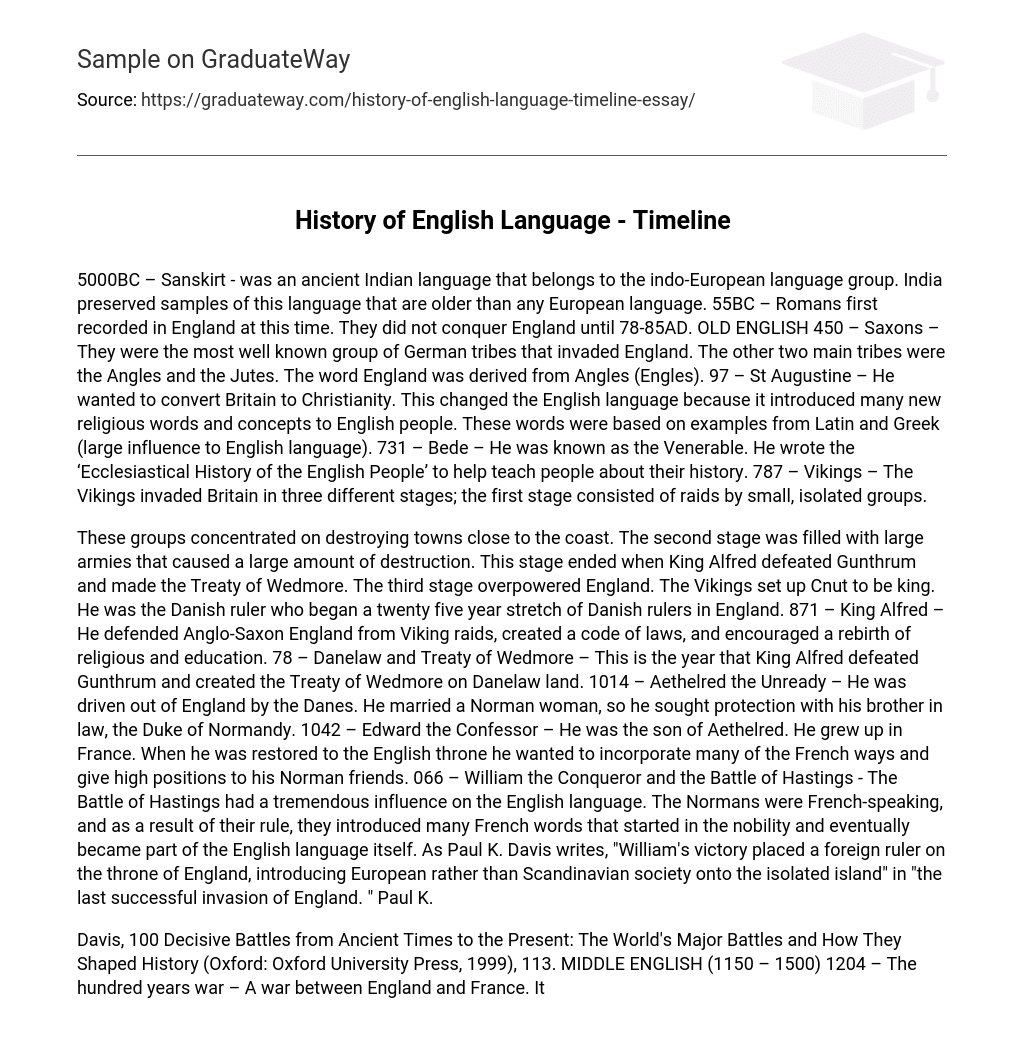5000BC – Sanskirt – was an ancient Indian language that belongs to the indo-European language group. India preserved samples of this language that are older than any European language. 55BC – Romans first recorded in England at this time. They did not conquer England until 78-85AD. OLD ENGLISH 450 – Saxons – They were the most well known group of German tribes that invaded England. The other two main tribes were the Angles and the Jutes. The word England was derived from Angles (Engles). 97 – St Augustine – He wanted to convert Britain to Christianity. This changed the English language because it introduced many new religious words and concepts to English people. These words were based on examples from Latin and Greek (large influence to English language). 731 – Bede – He was known as the Venerable. He wrote the ‘Ecclesiastical History of the English People’ to help teach people about their history. 787 – Vikings – The Vikings invaded Britain in three different stages; the first stage consisted of raids by small, isolated groups.
These groups concentrated on destroying towns close to the coast. The second stage was filled with large armies that caused a large amount of destruction. This stage ended when King Alfred defeated Gunthrum and made the Treaty of Wedmore. The third stage overpowered England. The Vikings set up Cnut to be king. He was the Danish ruler who began a twenty five year stretch of Danish rulers in England. 871 – King Alfred – He defended Anglo-Saxon England from Viking raids, created a code of laws, and encouraged a rebirth of religious and education. 78 – Danelaw and Treaty of Wedmore – This is the year that King Alfred defeated Gunthrum and created the Treaty of Wedmore on Danelaw land. 1014 – Aethelred the Unready – He was driven out of England by the Danes. He married a Norman woman, so he sought protection with his brother in law, the Duke of Normandy. 1042 – Edward the Confessor – He was the son of Aethelred. He grew up in France. When he was restored to the English throne he wanted to incorporate many of the French ways and give high positions to his Norman friends. 066 – William the Conqueror and the Battle of Hastings – The Battle of Hastings had a tremendous influence on the English language. The Normans were French-speaking, and as a result of their rule, they introduced many French words that started in the nobility and eventually became part of the English language itself. As Paul K. Davis writes, “William’s victory placed a foreign ruler on the throne of England, introducing European rather than Scandinavian society onto the isolated island” in “the last successful invasion of England. ” Paul K.
Davis, 100 Decisive Battles from Ancient Times to the Present: The World’s Major Battles and How They Shaped History (Oxford: Oxford University Press, 1999), 113. MIDDLE ENGLISH (1150 – 1500) 1204 – The hundred years war – A war between England and France. It had a significant impact on the development of English because France became the enemy. The English people didn’t want to use French words or terms anymore so the upper class began to want to learn and speak English. 1342 – Chaucer – He wrote his poetry in English, at a time when many writers were still unsure whether English was suitable for the purpose of writing.
Chaucer wrote, using many words from French and Latin, including, authority, power, horrible, homicide, comet, exclude and popular. This widely increased the vocabulary of English. 1362-Statue of Pleading – This law is the official recognition of the English language in England. Parliament was opened with its first speech made in English in this year. MODERN ENGLISH (1500 – Present) 1564 – Shakespeare 1604 – Cawdry – He wrote the first dictionary of hard words. 1712 – Academy – A group of people who were guardians and rule-makers of the English language. 755 – Samuel Johnson – He wrote a dictionary, which he hoped would help refine the English language. 1758 – Noah Webster 1822 – Grim’s Law – Jacob Grim found that Germanic consonants are tied to Sanskirt, Greek and Latin. His law states that there was a sound change sometime after the Germanic language broke from the neighbouring dialects of the parent tongue. 1828 – Websters Dictionary 1858 – The Oxford English Dictionary – Was originally known as A New English Dictionary on Historical Principles. It took 44 years to compile the first edition and it is updated every 40 years.





